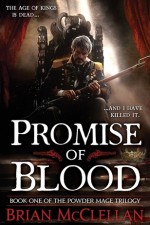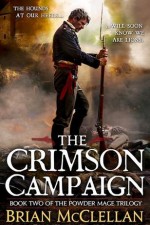The ‘Powder Mage’ Series and the Challenges of Writing Historical Fantasy
I don’t often post book reviews on my blog, but I’m making an exception here as my response to The Powder Mage series of books is complicated and possibly centres on some important aspects of writing Fantasy, especially fantasy with an historical context.
Brian McClellan’s The Powder Mage series has been hugely successful. I was immediately attracted by the covers, which are exquisite and promise all sorts of good stuff inside. In short he has taken the late seventeenth/early eighteenth century and added some cleverly intricate magic. The narrative is brisk, the characters are engaging and both Book 1 (The Promise of Blood) and Book 2 (The Crimson Campaign) – the two books that I’ve read – rattle along nicely.
All this sounds like just the sort of stuff I like to read, but I found that I had – and still have – reservations. What’s going on?
In short, my problem is that these books have enough minor irritations to detract from the enjoyment of reading them. My list of irritations might sound like quibbles, like I’m just being picky, but my disquiet really stems from something more important than just minor clunkiness. I maintain that this sort of Fantasy requires total immersion from the reader. It’s the good old ‘willing suspension of disbelief’ operating at full throttle. If a reader can fully give themselves over to the story, then the rewards are many. If they can’t, that’s where the disappointment lies. And this is where the issue of minor irritations is important. Every anachronism, every awkwardness that detracts – or distracts – from the historical/magical scenario yanks a reader out of the narrative. The fragile suspension of disbelief is broken.
The most grating of these disbelief breakers in the Powder Mage series can be summed up in one word: modernisms. When a modernism appears in a a quasi-historical setting like this, it’s a stumbling block. It immediately jolts one out of the milieu that has been created. It’s awkward, it’s disconcerting, and it’s worrying. The modernisms that I have most trouble with in this series often occur in the speech of the characters. Again and again they lapse into sounding like sassy, streetwise 21st-centurians. Things like ‘It’s complicated’, ‘Humour me’, and ‘There’s absolutely no way’ abound and that’s before I get to my particular bete noir, ‘OK’. It’s probably just me, but I wince whenever I hear a Fantasy character say ‘OK’. I know that the term goes back to the (late) eighteenth century, but it always strikes me as an arch-modernism. It reeks of the twentieth century and immediately sounds out of place at best or, at worst, it makes the whole scenario sound inconsistent and unconvincing.
I’m not saying that an imaginary world needs to be one hundred percent consistent with an actual historical setting, but part of the art of writing Fantasy of this sort is to seduce the reader into the imaginary world. Layering useful historical detail onto the imaginary world is an effective way of doing this – and not paying close attention to this is a source of unease. Of course a writer can pick and choose, can select what details to use and can bring together disparate elements, but there’s a limit. Fantasy readers are good at accepting the strange sitting right next to the bizarre, but that goodwill can be strained, or snapped, by going that step too far.
That’s my major hesitation about these books, the language the characters use. Modern turns of phrase, modern vocabulary and modern attitudes kept tripping me up. I couldn’t fully give myself over to them because of this. I enjoyed them, but I kept thinking that they could be better.
I’m not going to get into more arcane areas of historical inconsistency. That’s where I think the trouble is more with me than with the books, but I will say that I’ve done some reading about Brian McClellan and his inspirations. He tipped his hat in the direction of Bernard Cornwell’s Sharpe series, a particular favourite of mine. That influence can clearly be seen in the covers, which are a lovely nod in the direction of Sean Bean’s TV depiction of Richard Sharpe (a cracking series, well worth a look). Cornwell is excellent in the depth of his research. And details of dress, weapons, food, and living conditions are deftly dropped into the narrative of each of the Sharpe books and help to create a seamless whole. That’s why when I was reading The Crimson Campaign and the Kez cavalry was pursuing the Adros infantry I kept shouting out ‘Form square! FORM SQUARE!’ and wondering why none of the infantry commanders bothered with this basic tactic. But that’s just me being a history nerd, I suspect.
So, The Powder Mage series has its flaws. Is it still worth a read? Yes. I like the paciness of the narrative. I like the way the Fantasy setting is something different from the standard, mock mediaeval Fantasy setting. I like the handling of the characters, and the deviousness of the politics. Will I read Book 3? Of course I will.

